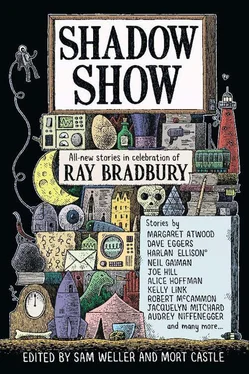Cate went forward. The young man in the black coat had clearly been drawn to her luminous beauty. He had a slow, winning smile, which he aimed at her. Abbey saw that his boots were covered with a layer of gray ash and that the fabric of his coat was frayed.
“I’ll bet you’re Bobby Marcus’s cousin,” Cate said as they approached each other. If Abbey didn’t know any better, she’d think her friend was flirting.
“That’s me.” He said his name was Lowell. He grinned broadly when Abbey gazed at his gloves. “I’ve been chopping wood,” he explained. “I’ve been camping here all summer. I can’t bring myself to sleep under a roof. “
Abbey had never seen him here on the nights when she’d come to read in the grass. She wondered if angels lied, or if that was only the territory of men.
Lowell offered them a drink. “I’m being sociable and you should be too. Whatever your parents say, you’re old enough for a beer.”
His invitation seemed more like a challenge. All the same they followed him through the grass to his campsite. “We’re only being polite,” Cate assured Abbey when she hesitated. “He’s right—we’re old enough.”
There was a pot for boiling water, a sleeping bag, a small canvas tent, a small axe.
“For chopping wood,” he said to Abbey, throwing down his gloves.
There was no stack of firewood, only some boughs from a twisted bramble tree. Abbey imagined he wasn’t a practiced camper, that he was a city boy who couldn’t even read a map of the stars. When Lowell reached out to get them some beers that he kept cooling in a fishing net in the creek, Abbey spied a black dog tattooed on his wrist. She felt a tightness in her throat, but she sipped at the cold beer, sharing a bottle with Cate. The girls sat close together on a log, and Abbey thought she could feel her friend’s heart beating alongside her own. The more beer the girls drank, the more Lowell talked. He told them about California, how beautiful it was, how the sky stretched on forever, how the night smelled of gardenias. He was a handsome young man, with a graceful way of speaking, and by the time he was done, California seemed like the promised land, a heaven all its own.
“That’s where I’m going,” Cate said.
“I knew that was what you wanted.” Lowell laughed. Abbey noticed that he seemed impressed by his own observations, the sort of man who had learned a lot about women in his lifetime and was quick to put these lessons to use. “I could see it in your future.”
Cate laughed, flattered, lowering her eyes. She was demure in a way Abbey had never known her to be. “You don’t even know me,” she said to Lowell, as if she wanted him to.
“You don’t believe me?” Lowell shifted over to sit beside Cate, his leg against hers. “I know you real well. I can see everything that’s going to happen to you.”
Abbey tugged on Cate’s sleeve. The intuition Mrs. Fanning had referred to felt slick, as if oil was pooling around them, dark and unstoppable. This late in August, time was already shifting, the light disappearing before anyone expected it to. “We have to go,” she urged.
“Keep me a secret,” Lowell said. He leaned close to Cate when he spoke, his breath moving the strands of her hair. His gray eyes were half closed, as if he was in the middle of a dream and that dream included Cate and her future. “I’d hate to be chased out and forced to sleep under a roof.”
Cate promised they would make up a story; they’d say they’d stayed late to practice their lifesaving techniques at the pool. In the darkening light, the ends of Cate’s hair looked faintly green, tinted by chlorine; perhaps the lie she intended to tell had turned her hair this color, or perhaps it was only the fading of the day that made it seem so.
Lowell walked them to the edge of the field. Abbey went first because she knew where the briars were; Cate came next, with Lowell following. Right before they stepped out of the tall grass, Abbey turned to see him kiss her friend. By then, it was dark.
That night Abbey climbed out her window. She kept her shoes under the porch steps, but tonight she went barefoot. She made her way through town, as she always did. Usually the darkened houses brought her a sort of comfort, but tonight the silence rattled her; she could feel it hitting against her bones. She stopped at the edge of the field. She thought she saw him beneath the tree, wearing his black coat and his gloves. She didn’t see an angel but a man, waiting for something, twisting the future into rope of his own devising. Abbey had that same chilled feeling she’d had when she’d first spied him. She turned and ran, feeling the threat he cast until she reached her corner. She went past her own house and sneaked into the Marcuses’ yard. She threw a pebble at the window. She threw another and another, and finally Bobby appeared.
He opened the window and leaned out, confused. “Are you crazy?” he whispered, waving his arms at her. “Go away.”
“Where’s your cousin?” Abbey wanted to know.
“He went back to California,” Bobby said. “My parents kicked him out.”
He shut his window, not wanting to say more, but Abbey sat down at the Marcuses’ picnic table to wait. After a while Bobby came out. He was only twelve, and Abbey had babysat for him once or twice, a fact he hated to be reminded of whenever she teased him, recalling how he used to cry to get his way. He was wearing a raincoat over his pajamas.
“Why’d they kick him out?” Abbey asked.
Bobby shrugged.
“There must have been a reason.”
Bobby’s parents were both teachers at the high school, warm-hearted, reasonable people.
“He was inappropriate,” Bobby said.
Abbey felt that chill. “Meaning?”
When Bobby clammed up, Abbey grabbed his arm and twisted. She was stronger than she appeared, perhaps from carrying stacks of books home from the library.
“Hey!” Bobby pulled away. “Okay. Fine. He said he could see the future.”
“They kicked him out for that?”
“Well, they thought he was crazy. I mean he went on and on about it, like he was cursing us or something. He wasn’t like that when he first came here. He sat with my mother for hours in the kitchen; he cut the lawn. Then he snapped and started saying he knew our fate and that we deserved everything we got.”
Abbey recalled the way Lowell had walked toward them, his gaze set on Cate.
“And I guess when they called California they found out he’s been in a lot of trouble. He’s not really even a cousin. He was just working for my uncle, and he stole his car. He took things from here, too,” Bobby said, moody, clearly having been told to keep the family troubles private.
“What kind of things?”
“He made me promise not to tell.”
Abbey grabbed Bobby’s arm and he shifted away. “Stupid things. Rope. Packing tape. Blankets. He took my dad’s axe that we used when we went camping.”
“What did he tell you about the future? Are you going to be a millionaire?”
Abbey was sarcastic by nature; her mother often complained about this, as well as her having her head in the clouds. Her mother insisted that Abbey would be beautiful if she stopped chopping her hair short and paid some attention to her appearance instead of wearing shorts and T-shirts and old hooded sweatshirts.
“He told my dad he’d be dead by December,” Bobby Marcus said.
“What does he know?” Abbey snorted. “He’s not a doctor.”
“My dad has leukemia.” Bobby’s voice was solemn. Abbey knew Mr. Marcus had been ill, but people in town didn’t know just how sick he’d been, only that he was once stout and was now painfully thin. “He’s been in remission.”
Читать дальше



![Lord Weller - Ритера или опасная любовь [СИ]](/books/421202/lord-weller-ritera-ili-opasnaya-lyubov-si-thumb.webp)








